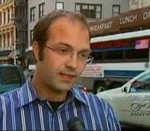Yankees and New York Decide to Settle First Amendment Case
 Last month the City of New York and the New York Yankees baseball club decided to settle rather than litigate a lawsuit filed by a disgruntled fan who was ejected from a Red Sox-Yankees game in August of 2008, ostensibly for refusing to stay in his seat during the playing of God Bless America.
Last month the City of New York and the New York Yankees baseball club decided to settle rather than litigate a lawsuit filed by a disgruntled fan who was ejected from a Red Sox-Yankees game in August of 2008, ostensibly for refusing to stay in his seat during the playing of God Bless America.
Had the case gone to trial, it could have raised complicated First Amendment questions relating to the ability of a municipally owned stadium to regulate unpopular political speech and symbolic gestures on the part of its patrons.
The ejected fan, Bradford Campeau Laurion, shown above, a 29-year old resident of Queens, New York, was represented by the New York Civil Liberties Union. Under the reported terms of the settlement Campeau received $22,000, $12,000 of which went to the NYCLU for legal services.
Although the details of the incident are still a matter of dispute, Campeau has consistently asserted that he was not trying to make a political statement and that he left his seat during the playing of God Bless America only because he was desperate to go to the bathroom after drinking two beers. Campeau was attending the game with a friend who was a Yankee season ticket holder.
When Campeau left his seat he was confronted by a New York City police officer who insisted that he would have to remain in his seat until the song was finished. Campeau claims that he told the policeman, “, ‘I don’t care about God Bless America. I just need to use the bathroom” and that in response to that statement the policeman and one of his colleagues pinned his arm behind his back and escorted him to the front entrance of Yankee Stadium where he was evicted into the street. According to Campeau, on the way out the policemen told him to “get out of their country if I didn’t like it.”
The officer told a different story, insisting that the ejection had nothing to do with the song. According to his account, Campeau was observed “standing on his seat, cursing, using inappropriate language and acting in a disorderly manner, while reeking of alcohol.” According to the officer, he “decided to eject him rather than subject others to his offensive behavior.” The accuracy of this description is disputed by Campeau and his friend, the season ticket holder.
The settlement contained no confession of liability and, in fact, included a stipulation whereby the plaintiff agreed that the City and the Yankees had the right to regulate the conduct of fans during the singing of God Bless America and at other times. Although Campeau insisted that he was unaware of the policy, the Yankees had, prior to the game Campeau attended, adopted a policy of requiring patrons to remain in their seats during the playing of the National Anthem and God Bless America.
In spite of this concession, New York Civil Liberties Union Executive Director Donna Lieberman pronounced that “[t]his settlement ensures that the new Yankee Stadium will be a place for baseball, not compelled patriotism.” Christopher Dunn, NYCLU associate legal director and lead counsel in the case added: “Neither the Yankees nor the NYPD can force people to engage in acts of political loyalty. As a result of our lawsuit, fans can now go to a ballgame at Yankee Stadium knowing they will not be subjected to NYPD-enforced patriotism.”
A more cynical observer might conclude that the point of the case is that one should plan on going to the bathroom in Yankee Stadium during the playing of God Bless America. The bathrooms should be easily accessible, and if you get thrown out for leaving your seat you can cash in your ticket for $10,000.


 I was going to write a very compelling piece on What Commissioner Kappos Should Do About Tafas (which I care very, very much about in my scholarship and
I was going to write a very compelling piece on What Commissioner Kappos Should Do About Tafas (which I care very, very much about in my scholarship and